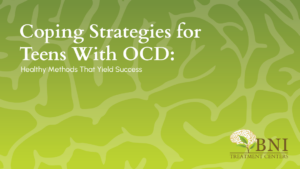The teenage years are delicate and formative. Their psychological and physical development is in hyper mode, and they face these challenges that may mar further development. The adolescent stage is the most vulnerable because the risks of mental disorders and drug abuse are at their peak. They are exposed to social pressure, peer influence, and the media. Adolescents become depressed and traumatized and usually indulge in drugs and alcohol as a coping mechanism. According to the National Institute on Drug Abuse, 31.3% of teenagers in 10th grade abused alcohol in the past year, while 19.5% used cannabis.
In many cases, parents or guardians can only do so much to safeguard their adolescents from this vulnerability. However, the issue isn’t falling prey to abuse but lacking access to the proper treatment and support to overcome this addiction and mental health challenge. Dual diagnosis treatment is the best option for treating mental health conditions and addiction simultaneously. If you have a child with co-occurring mental health disorders, seek professional help immediately.
This blog explains what dual diagnosis treatment for teens is and its benefits.
What is Dual Diagnosis Treatment for Teens?
Teen dual diagnosis treatment is a program that addresses co-occurring conditions or dual diagnosis. A co-occurring condition is when an individual manifests a mental disorder, such as depression and bipolar, and substance addiction. A teenager with a dual diagnosis must be treated for both disorders simultaneously to accelerate recovery.
Signs of Co-Occurring Disorders
Identifying co-occurring disorders is difficult because of the overlapping symptoms, but below are common signs:
- Severe Symptoms: The symptoms of addiction and mental health disorders become more serious when they co-occur. For example, bipolar may worsen when combined with drug use.
- Poor Treatment Response: When an individual fails to respond to treatment for either substance abuse or dual diagnosis, it may suggest the presence of another disorder that isn’t being treated.
- Inexplicable Physical Symptoms: Co-occurring disorders can produce unexplainable symptoms. They may include disruption in sleep patterns or chronic pain.
- High-Risk Behaviors: The teenager engages in criminal ventures, promiscuous sexual activities, etc. The behavior usually manifests when the teenager is triggered.
Other symptoms include self-medication, financial and social problems, and difficulties fulfilling responsibilities.
Benefits of Dual Diagnosis Treatment for Teens
Dual-diagnosis treatment for teens is beneficial in the following ways:
Comprehensive Evaluation
Dual diagnosis treatment thoroughly evaluates the teen to understand what constitutes the co-occurring condition. This assessment helps the medical practitioner develop an individualized plan that addresses the teenager’s needs.
Simultaneous Treatment
To ensure a successful outcome, a teenager with a co-occurring condition must be treated for both disorders. Treating them individually may allow the other to wax stronger. Above all, the cost of individual treatment will be expensive.
Holistic Approach
Dual diagnosis treatment considers all aspects of the teen’s life and underlines factors contributing to the disorder. As a result, the health expert can determine the right approach to employ.
Integrated Support
Teen dual diagnosis treatment uses a multidisciplinary team of medical experts, including addiction specialists and psychiatrists. This collaboration ensures that the teenager’s challenges are addressed effectively.
Higher Chances of Recovery
Because addiction and mental health disorders are treated simultaneously, there’s a higher chance of long-term recovery. Teens develop healthier ways to cope with cravings and prevent a relapse.
Enlightenment
Co-occurring treatment helps teens understand the relationship between their addiction and mental condition. Understanding this relationship will help teens identify triggers and develop effective ways to manage their condition.
Supportive Environment
Dual diagnosis treatment creates a serene and comfortable environment where teens with similar challenges can mingle. Group therapies are provided in this setting to encourage participants to share their experiences and learn each other’s coping strategies.
Incorporates Family Support
Family support is essential in a teen’s recovery. Dual diagnosis treatment incorporates family therapy sessions to enlighten family members about the condition and the treatment process. It will help family members understand the disorder and support their adolescent children in the best way.
Relapse Prevention
The treatment option equips teens with strategies to prevent relapse. Teenagers recognize potential triggers and follow a plan to avoid slipping back into addiction.
Better Quality of Life
Dual diagnosis treatment addresses the various challenges teenagers face, thus improving their overall quality of life. Teenagers have improved self-esteem and better cognitive functioning.
BNI Treatment Center Offers a Dual-Diagnosis Treatment
Early detection is crucial to ensure a quick recovery. Many teenagers with co-occurring conditions often contact professionals when their abuse problem has hit its apex. This slows down recovery.
Medical professionals recommend early treatment. So contact a certified medical expert if you or a teen you know has a co-occurring condition. BNI boasts of certified professionals that will help teens recover from substance abuse and mental disorder. We have a state-of-the-art facility that caters to co-occurring disorders. Our Los Angeles mental health program is comprehensive, holistic, and individualistic. Each patient is evaluated before we follow up with a recovery plan. Contact us today to start your recovery and find mental health treatment for teens.



